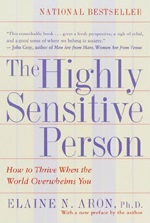![]()
First of all, what does it mean to be a highly sensitive person?
Not to be confused with introversion or shyness, the concept of the “highly sensitive person” (HSP) was coined by Elaine N. Aron, Ph.D. in the early 1990’s and refers to about 15-20% of the population with a highly sensitive nervous system. In a nutshell, people with this inherited neural trait are more aware of subtleties in their surroundings and more easily overwhelmed in highly stimulating environments.
How do I know if I’m a highly sensitive person?
Take a quick free online self-test by Dr. Aron or check out her book “The Highly Sensitive Person” (1996).
Key indicators might include:
- easily overwhelmed by strong sensory input
- affected by other people’s moods
- bothered by intense stimuli, like loud noises or chaotic situations
- seen by others as sensitive or shy
You can probably see how this trait might interfere with realizing one’s full potential at work, but there is some good news…
The pros and the cons of being an HSP in the workplace.
Consider this: 75% of the population in the U.S. is outgoing and 70% of HSPs tend to be introverted. As an HSP myself, I can attest to the fact that many work situations can be very stressful for introverted HSPs who notice everything, avoid conflict, and may not speak up. These situations can include in-person performance evaluations, team projects, staff meetings, presentations, interviews, forced social interactions with coworkers, and the list goes on.
HSPs in the workplace might find themselves:
- unnoticed or undervalued due to a tendency to be less assertive
- prone to bullying or trampling over due to a non-confrontational nature
- underutilized
- perceived as weak or unsociable
However, the good news is that HSPs are generally:
- better at spotting and avoiding errors
- highly conscientious
- good with tasks requiring vigilance, accuracy, and attention to detail
Thriving as an HSP in the workplace.
HSPs can and do thrive professionally and are a valuable asset to the workforce. But until sensitivity is better understood and recognized, here are some tips for HSPs to level the playing field.
Learn about it- Acquiring knowledge about being an HSP will give you peace of mind knowing you are perfectly normal and that you’re not alone; many others face the same challenges. Here are a few resources to get you started:
- Join an online discussion board for HSPsCheck out Dr. Ted Zeff’s website (especially male HSPs)
- Read Dr. Aron’s series of books and list of resources
- Visit Dr. Aron’s website and blog (called Comfort Zone)
Own it– Remember: Sensitivity is an inherited trait; refuse to let anything make you feel bad for something that you did not choose. Try the following to learn to value your sensitivity:
- Rethink how you may feel about past experiences in light of what you now know about your sensitivity.
- Think about how other HSPs have contributed to society.
- Take opportunities to show the advantage of being highly sensitive through the projects you work on or assignments in which you excel.
Cope with it– Dr. Aron offers a lot of advice in her book. Several key strategies you can try are:
- Over-prepare for stimulating situations- Anticipate questions, prepare responses ahead of time, and don’t rely on memory alone- it’s the first thing to go when overwhelmed- write it down.
- Rest, even with just your eyes closed (80% of sensory stimulation comes in through the eyes).
- Consider coming clean about your sensitivity.
- Save up uncomfortable things to do that aren’t time sensitive and do them when you have especially high energy.
- Make a deal with yourself that if you try something and hate it you will never have to do it again.
I hope this brief summary about HSPs has piqued your interest enough to learn more. As an HSP myself, I’d love to hear your thoughts and reactions in the comments; and even if you’re not an HSP, you most likely work with one!
Christine McMahon is part of the GovLoop Featured Blogger program, where we feature blog posts by government voices from all across the country (and world!). To see more Featured Blogger posts, click here.







Leave a Reply
You must be logged in to post a comment.